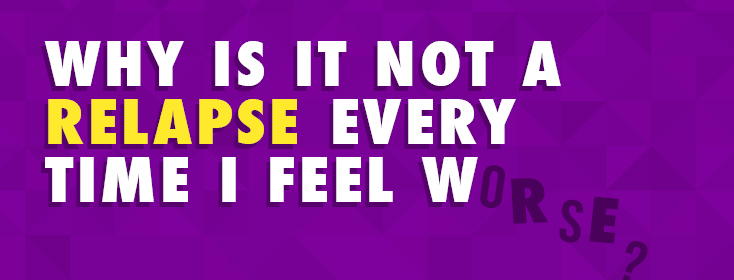Why Is It Not a Relapse Every Time I Feel Worse?
There are times when symptoms get a strong hold of me, making me feel worse for a few hours, and gets me worrying about relapses. Living with Multiple Sclerosis can be so unpredictable and, when my legs burn harder, the numbness is more pronounced, the fatigue really knocks me down, or that new tingly sensation shows up in my toes, I wonder, “Am I having a relapse or is what I’m feeling some sort of pseudo-exacerbation or is something else happening altogether?”
Sound familiar?
I recently attended a patient education presentation, “Hot Topics in MS”, hosted by the Multiple Sclerosis Association of America (MSAA) with Dr. Rip Kinkel, Director of the Multiple Sclerosis Program in the Department of Neurosciences at UC San Diego. During one part of his presentation, he posed the question: “Why is it not a relapse every time I feel worse”? I was grateful that he talked about this because I suspect this comes up for a lot of us and I love his list “stuff-to-rule-out-first” before any conclusions can be made.
7 things to consider when suspecting a relapse:
- Medication effects
- Effect of other medical conditions
- Painful stimuli increasing spasticity and spasms
- Tenuous functional status with little reserve
- Fluctuations in symptoms with hormonal cycle
- Effects of stress, anxiety, or depression
- Elevated temperature causing Uhthoff’s phenomenon
When I saw this list flash up on the screen, five stood out as being really familiar to me: #1, #2, #5, #6, and #7. Okay, okay. I realize this is practically the full list but this is stuff is important. Let’s run through it together.
First things first, what are the side effects of the meds we take?
Dr. Kinkel echoed what I heard Dr. Jody Corey-Bloom, Professor of Neurosciences at UCSD, say last year during the Annual MS Symposium in San Diego when she reminded the crowd that when MSers feel something new or elevated, it is always smart to check side effects of all medications first before leaping to the assumption of an MS relapse. Makes sense, good advice doctors.
Is what we feel due to other medical conditions?
This is something to consider for sure. A couple of years ago, I experienced intense double vision and because I live with MS, I naturally attributed it to the disease. The words “relapse” certainly entered my mind. But, lo and behold, the double vision I was experiencing was not MS related at all. I consulted my neurologist and an ophthalmologist who determined it to be a convergence insufficiency. I was prescribed “eye push ups” to help.
Are we feeling worse because of our hormones?
(Sorry fellas, this one is for the ladies) Ugh. This is definitely possible, at least for me. I’ve noticed that right before my menstrual cycle, I feel worse and suspect it’s because my body temps go bonkers causing me to feel worse. Not fun, especially because I’ve also starting noticing some kind of new trend – hot flashes. Good grief! To help, I discovered a cool trick. When I start to feel warmer, I either run very cold water on the inside of my wrist, right at the pulse point, or hold ice cubes there, for about 15 minutes. Once I’ve recovered, I can return to doing whatever it was I was doing - hopefully something fun!
How are stress, anxiety, and/or depression making us feel?
I think it’s always a good idea to check in with ourselves, honestly, to see how stress may be impacting our lives and the way we feel. The same goes for anxiety and depression. All three can cause a variety of physical responses, right? I try (try being the operative word here) practicing stress-relieving activities like exercise, meditation, yoga, and eating well.
Is elevated temperature causing Uhthoff’s phenomenon?
What is Uhthoff’s phenomenon? I like to think of it as MS symptoms feeling worse when the body gets overheated from stuff like hot weather, exercise, hot tubs, etc. This happens to me all the time, especially when I hang out too long in the hot California sun. Luckily, I work and live in spots with lots of A/C – super helpful in keeping me cool and feeling as best I can.
Naturally, I’m not a doctor nor do I play one on TV. If you are worried about a new feeling or flare up, please call your neurologist and run through Dr. Kinkel’s list together to ensure everything is considered.
How about you? Have you experienced times, like me, when something happens with your body that feels like MS but turned out not to be related? Or, maybe the opposite happened? The flare up was indeed related to MS and what you experienced was a relapse? I hope this list of “7 things to consider when suspecting a relapse” helps you navigate the difficult course of Multiple Sclerosis.
Take care,
Christie

Join the conversation